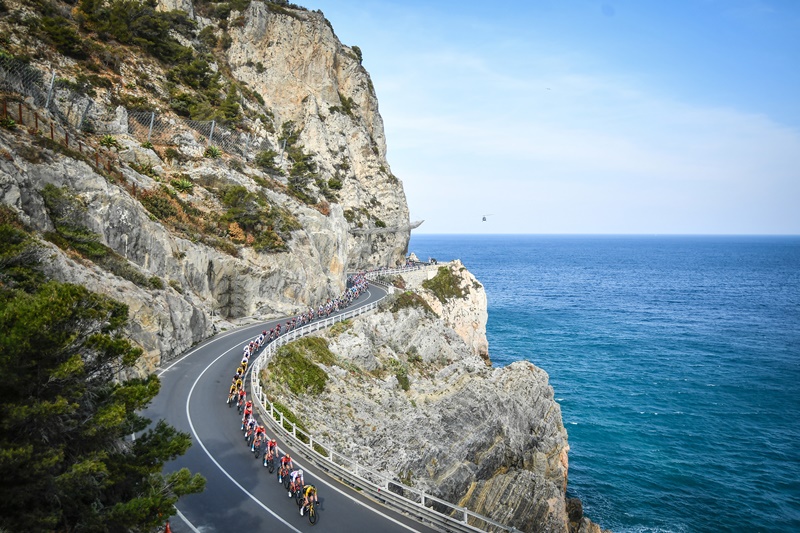
So where were we? Last time we spoke – all the way back in March – I was advising you not to assume that Tadej Pogacar would hoover up victories left, right and centre this season – which is what a lot of people felt after he won Strade Bianche.
Let’s see how that prediction panned out over the remaining spring classics.
Milan-San Remo
Matej Mohoric was two seconds off the lead group at the top of the Poggio, the last climb before the Milan-Sanremo finish. By the first corner, he’d caught them and he then immediately went past.
Speaking to my colleagues at road.cc about what he attempted to do upon finding himself at the front of the race, he said: “[I] made sure that I made a scene so that they would actually get a little bit scared to follow me and [put] their lives at risk.”
He pretty much delivered on that. There are brick walls on both sides of the Poggio and Mohoric positively skimmed them on the bends. At one point he ended up on a narrow pavement and then both wheels slid simultaneously on the final corner, leaving him with what looked like mere millimetres to ride on without crashing.
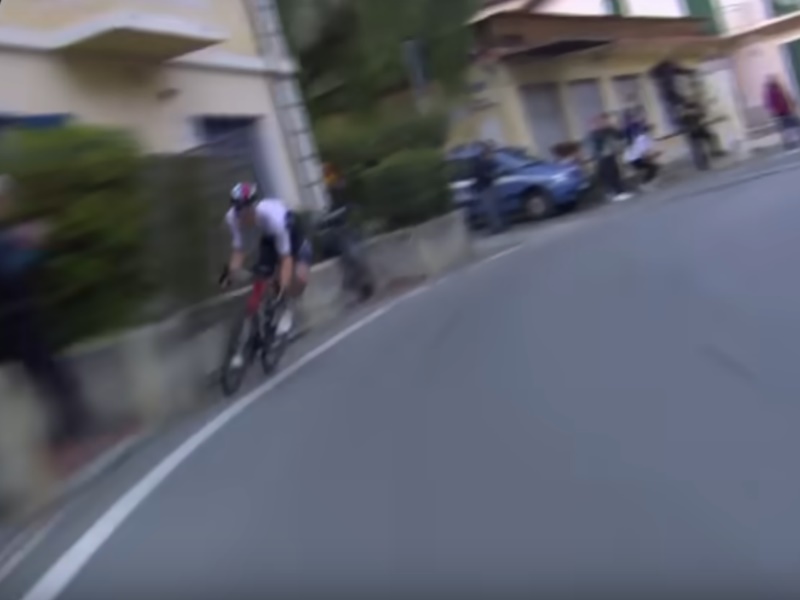
“With the way that I was attacking the corners, I think I would probably choose not to follow myself on that descent,” he reflected.
By the bottom, Mohoric had gained five seconds and that was enough. He put his advantage down to the use of a dropper seatpost – the kind they use in mountain biking – to lower his centre of gravity.
Pretty sure ‘being insane’ had a far bigger impact.
The Tour of Flanders and other Belgian cobbles
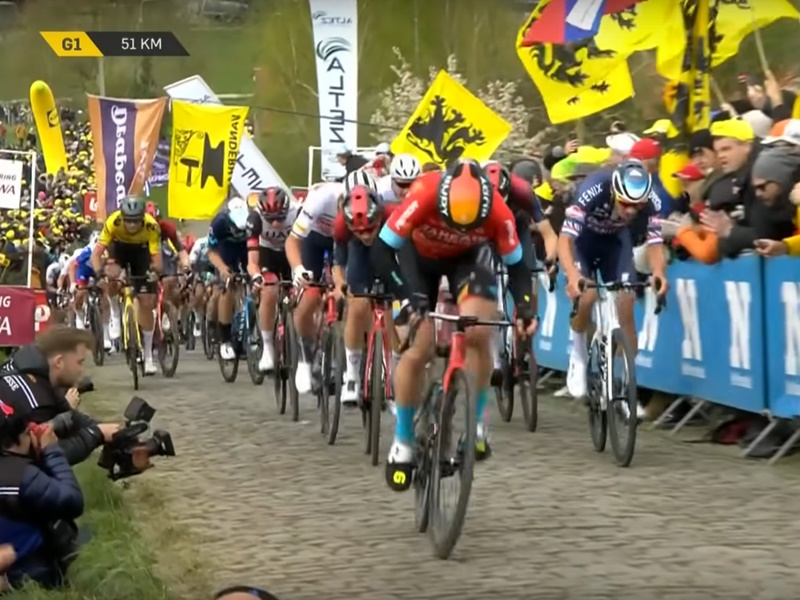
Having previously been known as the E3 BinckBank Classic, Harelbeke–Antwerp–Harelbeke and E3-Prijs Vlaanderen, the race I’ve always tended to call E3 Harelbeke is currently going by the name of the E3 Saxo Bank Classic.
Wout van Aert won it this time around after he and team-mate Christophe Laporte got away with 40km to go. The two men worked together to maintain their advantage with Laporte willingly accepting second place after quite obviously being the more knackered of the two in the closing stages.
Van Aert’s latest victory continued a long tradition of Belgian one-day races being won by Belgians. That’s the way things generally work when you strew cobbles along a route. It was therefore something of a surprise when Gent-Wevelgem was won by Biniam Girmay from Eritrea – not least because I’d never heard of him before.
The 21-year-old outsprinted Laporte and a couple of Belgians to take the win. A few other strong showings over the spring indicate we will probably see plenty more of him in coming years.
Then it was time for the big one, the Tour of Flanders. The victor here was a bit more predictable: Mathieu van der Poel, a great big gangle of pedal power and precisely the kind of rider you expect to win this race (as he did in 2020). His biggest threat was a bit less predictable, but still no great surprise: Tadej Pogacar.
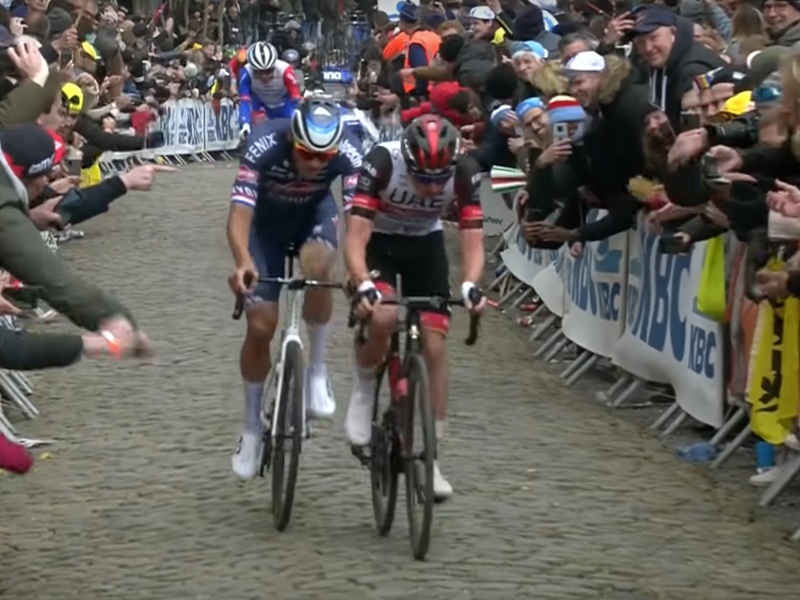
There were another 163 riders in the race, but it’s not entirely misleading to recount the race as a head-to-head. It went how you’d envisage. The Slovenian Tour de France champion hit the climbs hard. Van der Poel stuck with him and then outsprinted him at the finish. (In fact a couple of guys from the chase group went past Pogacar too and he actually finished fourth.)
Reassuringly, the women’s race was won by Lotte Kopecky, who did her bit to maintain the natural order of things by being Belgian. She’d also won Strade Bianche and would go on to finish second in Paris-Roubaix shortly afterwards.
Paris-Roubaix
Paris-Roubaix actually swapped dates with Amstel Gold this year due to the French presidential election. That knackers up the narrative of the cobbled races and also the Ardennes classics though, so let’s pretend it didn’t happen that way and that Paris-Roubaix came next.
The race was won by Ineos Grenadiers’ Dylan van Baarle, who was in form having finished second in Flanders, but who had also failed to make the time cut in this very race just six months earlier.
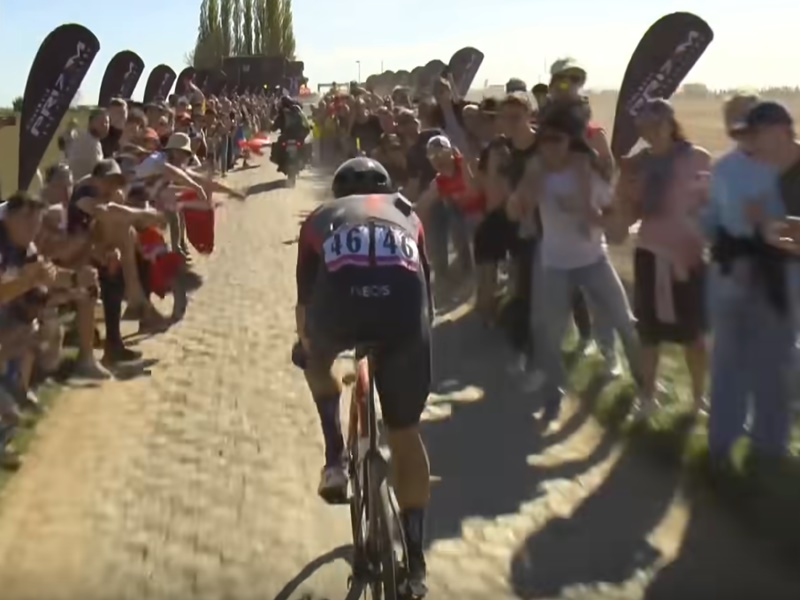
He got into a small front group that also contained Matej Mohoric near the finish then attacked them far, far better than he realised. Having made his effort with 19km to go, he figured the chase group was close behind when he entered the velodrome that hosts the finish, only to discover he actually had a sizeable 1m47s advantage.
If you’re wondering who edged out Kopecky in the women’s race, it was Italian rider Elisa Longo Borghini, the winner of the 2015 Tour of Flanders. I think there’s probably a good chance she’d have won Roubaix before now if women had been allowed to race it before 2020. (She was third last year.)
The Ardennes classics
Amstel Gold brought what I’d call ‘another’ spring win for Ineos Grenadiers if it hadn’t in reality come before Paris-Roubaix. Michal Kwiatkowski isn’t the rider he was from 2015 to 2017 when he previously won this race and also the World Championships, Milan-Sanremo and Strade Bianche. You do wonder whether that’s a physical thing though or whether he’s just overly-embraced team responsibility as his Sky/Ineos career has worn on.
Marta Cavalli won the women’s race and then, as is often the case with the hilly Ardennes races, took La Fleche Wallonne as well.
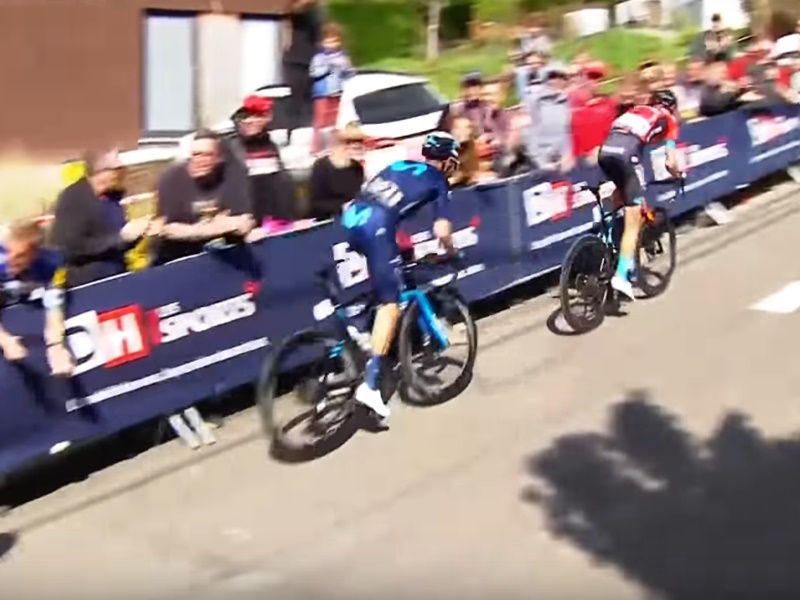
The absolute king of La Fleche Wallonne for the last 10 years has of course been Alejandro Valverde, whose incredible record in the race actually stretches back even further than that. A mere 16 years after his first win in 2006, the Spaniard was in the mix again in his final appearance before he retires at the end of this season. At the age of 42, he’s lost a little zip, but not so much that anyone other than Dylan Teuns (Belgian) could beat him up the Mur de Huy.
Another Belgian, Remco Evenepoel, took the men’s Liege-Bastogne-Liege ahead of two others, Quinten Hermans and Wout van Aert. This represents the first truly massive win for a rider who is considered one of the upcoming superstars of the sport.
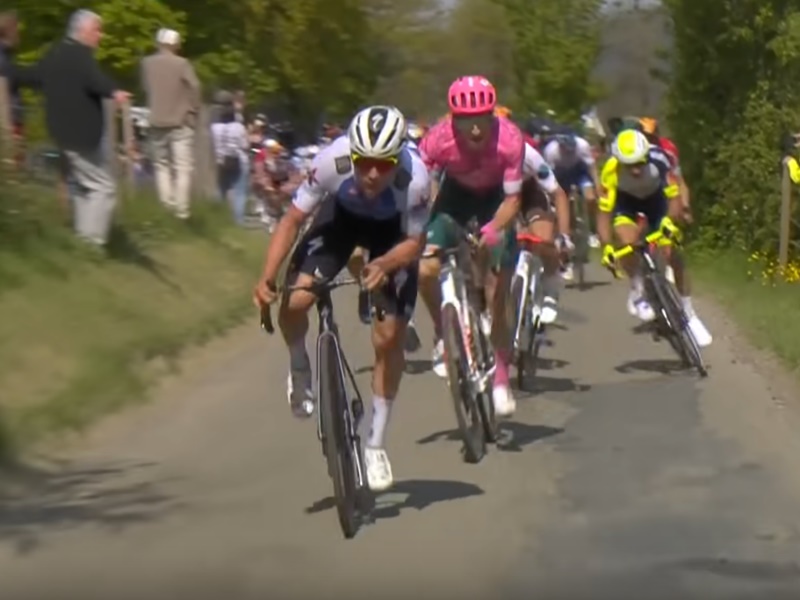
That said, as impressive as his win was – and he really did just beast everyone off his wheel with 30km to go – I can’t help but highlight the absence of last year’s winner, Tadej Pogacar, who was attending his mother-in-law’s funeral.
The man Pogacar edged out last time around, world champion Julian Alaphilippe (a team-mate of Evenepoel’s) did make it to the start line but not the finish after suffering a collapsed lung, a broken shoulder blade and two broken ribs in a 70km/h mass pile-up. As you might imagine, he’s no certainty for the Tour de France.
The women’s race was won by Olympic time trial champion, Annemiek van Vleuten – second last year, but a previous winner in 2019. After finishing second in Strade Bianche, the Tour of Flanders and La Fleche Wallonne, the 39-year-old appears to be in Valverde-esque late career form.
What’s next?
The Giro d’Italia starts on Friday (with the first three stages in Hungary). Overall contenders include 2019 champion Richard Carapaz, 2017 champion Tom Dumoulin, Simon Yates, Alejandro Valverde and our old friend Domenico Pozzovivo. Mark Cavendish is racing too (which almost certainly means he’s not going to be at the Tour de France).
You can sign up to get the weekly recaps from this website emailed to you here.
Odds are they won’t actually be weekly though. I’ll most likely do it in two ‘halves’ (Stages 1-9 and then Stages 10-21.)
Leave a Reply